|
|
|
Sort Order |
|
|
|
Items / Page
|
|
|
|
|
|
|
| Srl | Item |
| 1 |
ID:
117720


|
|
|
|
|
| Publication |
2013.
|
| Summary/Abstract |
Successive governments have sought to address the enduring problem of corruption in Macao. Yet the institutional framework for dealing with corrupt practices has singularly failed to live up to political promises and public expectations of clean government. The Ao Man-long case, in which a former Secretary for Transport and Public Works was found guilty of corrupt practices involving an estimated $800 million (about US$100 million), rocked public confidence in the anti-corruption institutions and gave credence to the widely-held view that an expanded gaming industry had provided more opportunities for illicit behavior. Diagnosing the causes of failure suggests that neither a lack of resources nor the absence of rules serves to explain the continuing high levels of bureaucratic corruption. Rather the explanation for the failure of the institutional framework lies in the content of the rules and the way in which they are implemented. While this situation continues to persist, it is unlikely that the problem of bureaucratic corruption will be resolved or that its wider impact on the government's legitimacy will be reduced.
|
|
|
|
|
|
|
|
|
|
|
|
|
|
|
|
| 2 |
ID:
117716
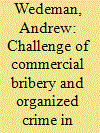

|
|
|
|
|
| Publication |
2013.
|
| Summary/Abstract |
Corruption has been classically defined as the misuse of public authority for private gain, which implies that corruption necessarily involves official authority and hence public officials. Bribery, however, often involves transactions between officials and private interests, including business interests, whereby the private party seeks to bend public authority to their advantage by paying off their official interlocker. Even in its classic form, therefore, corruption often spans both the public and the private. Public officials are not, however, alone in exercising authority. Managers and corporate officers also wield authority or fiduciary responsibility on behalf of others and can abuse that authority for private gain, not only in transactions involving public officials, but also in transactions with private parties. This article examines how China's anti-corruption institutions have dealt with 'commercial corruption', including both public-to-private corruption and private-to-private corruption. It also examines the linkages between organized crime and corruption in China.
|
|
|
|
|
|
|
|
|
|
|
|
|
|
|
|
| 3 |
ID:
117721
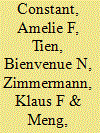

|
|
|
|
|
| Publication |
2013.
|
| Summary/Abstract |
In this paper we provide an overview of China's human capital strategy and educational achievements over the last two decades. While everyone acknowledges China as an economic superpower, very few are aware of or realize China's notable achievements in education as well as its internationalization of education. Since 1978, the landmark for the foundation of the Chinese modern higher education system, China has made tremendous strides in education both domestically and internationally. While China maintains 10% growth in GDP, albeit with a GDP per capita at a low level for a developing country, it is also producing serious scholars and a tremendous amount of scholarly output; more and more Chinese students are seeking higher education abroad; and international students are showing a rising interest in receiving education in China.
|
|
|
|
|
|
|
|
|
|
|
|
|
|
|
|
| 4 |
ID:
117723
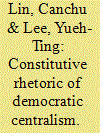

|
|
|
|
|
| Publication |
2013.
|
| Summary/Abstract |
Employing the theoretical framework of constitutive rhetoric, this paper explores Chinese conceptions of democracy by examining Mao Zedong's speeches and writings. This rhetorical examination seeks to show how democracy is understood, defined, and conceptualized in China. Several themes from Mao's most famous speeches and writings are discussed in the light of his concept of democratic centralism. The rhetorical analysis supports the notion that Chinese communism includes democracy, as purported by Mao; however, this culturally unique form of democracy (i.e. democratic centralism) does not match the representative form of democracy employed in the West. Understanding that democracy is conceptualized distinctly by Chinese communist followers of Mao may provide insight for future international studies and relations.
|
|
|
|
|
|
|
|
|
|
|
|
|
|
|
|
| 5 |
ID:
117718
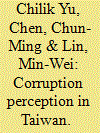

|
|
|
|
|
| Publication |
2013.
|
| Summary/Abstract |
Taiwan's transition from authoritarian to democratic rule has not necessarily resulted in lower levels of perceived corruption on the island. Indeed, many Taiwan citizens have come to view the problem of corruption as worsening in recent years. To understand what these perceptions are and why they have emerged, this study examines Taiwanese attitudes toward corruption and its control from a bottom-up approach. By utilizing data from an original, nationwide public opinion survey, the authors identify the most prevalent corrupt behaviors and the institutions in Taiwanese society that are most susceptible to corruption. The paper then investigates three 'bottom-up' factors that help explain variations in the perception of corruption by citizens: encounter with government bureaucracy, party identification, and the effect of media. Analysis of survey data indicates that all three factors influence how Taiwanese people feel about corruption and corruption-related issues.
|
|
|
|
|
|
|
|
|
|
|
|
|
|
|
|
| 6 |
ID:
117722


|
|
|
|
|
| Publication |
2013.
|
| Summary/Abstract |
Why is there no large-scale labor movement out of intense labor conflicts in current China? Based on a comparative case study of two groups of workers-state workers vs. temporary workers-this paper is an attempt to explore the concrete processes and mechanisms of workers' struggles-how they navigated among street protests, office petitions and court prosecutions through their interaction with state agencies. The argument is that different workers obtained different symbolic rewards instead of material concessions, based on their different social positions and historical trajectories. Unlike the classical 'fragmentation' argument which attributes the working class's inaction to its internal divisions, this argument focuses on the interaction between the differentiated workers and the local state agents, during which the workers lost their radical momentum and became subjected to the state's peaceful taming based on the workers' differences. This is a process called 'dispersive containment', i.e. dissipating the labor conflicts through divergent symbolic treatment of working-class protest without granting material rewards to them.
|
|
|
|
|
|
|
|
|
|
|
|
|
|
|
|
| 7 |
ID:
117717


|
|
|
|
|
| Publication |
2013.
|
| Summary/Abstract |
The relationship between fiscal decentralization and corruption is highly controversial but insufficiently tested with respect to China. This article empirically tests whether fiscal decentralization aggravates corruption in China's local governments. To acquire more robust results, we employ multiple corruption and fiscal decentralization measures and collect data for 31 provinces from 1998 to 2008. Fixed effects panel models estimate the impact of fiscal decentralization on corruption after controlling for gross regional product per capita, the relative wage in the public sector compared to the private sector, political leadership changes, education levels, law enforcement and the number of NGOs. Our findings suggest that China has experienced a trend towards fiscal recentralization rather than decentralization in the 2000s. We also find the moderating effect of the level of law enforcement on corruption: fiscal decentralization in local governments with strong law enforcement deters corruption but the opposite relationship is found when their law enforcement is weak. The implication of our research is that a sound legal system and political will are prerequisites for successful fiscal decentralization.
|
|
|
|
|
|
|
|
|
|
|
|
|
|
|
|
| 8 |
ID:
117715
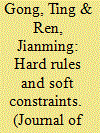

|
|
|
|
|
| Publication |
2013.
|
| Summary/Abstract |
The initial paragraphs of this article outline the broad themes of this special section, drawing attention to changing perceptions and definitions of corruption and to corruption prevention practices in Greater China. The remainder of the article focuses on a particular theme: the relationship between conflicts of interest and corruption in both theoretical terms and in its application in mainland China. Conflicts of interest are conceptualized as the incompatibility between the public interest associated with official duties and interests derived from the private domain. Such conflicts do not always necessarily lead to corruption and may be distinguished from it. By examining the way in which they are regulated in China, we argue that although an intricate web of rules has been established, regulations alone cannot guarantee ethically sound behaviour if there is no supportive value framework of like-minded civil servants. Rules require interpretation and if this discretion means that civil servants choose to follow an administrative culture and personal values that conflict with the regulations, they will have little effect. Hard rules may mean soft constraints.
|
|
|
|
|
|
|
|
|
|
|
|
|
|
|
|
| 9 |
ID:
117719


|
|
|
|
|
| Publication |
2013.
|
| Summary/Abstract |
In recent years, the Hong Kong government has sought to supplement its highly successful, rule-based anti-corruption strategy with value-based elements which stress the importance of ensuring personal integrity and avoiding conflicts of interest. The introduction of these elements raises issues about the relationship between rules and values within public organizations seeking to enhance their integrity management systems. In the Hong Kong case, it is argued, the predominance of the rule-based system means that value issues, such as potential conflicts of interests, tend to be pushed up through the hierarchy for resolution at higher levels in the organization. In addition, the development of informal rules relating to value issues limits the extent to which public officials can exercise personal discretion. The article is based on a survey of Ethics Officers and Assistant Ethics Officers in the Hong Kong government in June 2010 and on follow-up interviews conducted between October and December 2010.
|
|
|
|
|
|
|
|
|
|
|
|
|
|
|
|
| 10 |
ID:
117724
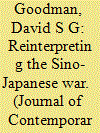

|
|
|
|
|
| Publication |
2013.
|
| Summary/Abstract |
The War of Resistance to Japan (1937-1945) has long been recognised as the most important stage in the Chinese Communist Party's rise to power in 1949. Particularly in its North China base areas, the Chinese Communist Party is said to have pursued moderate, inclusive, and mobilisatory tactics during the war years to build a movement for national salvation from the bottom up, which eventually led to the establishment of the People's Republic of China. The evidence from the heart of the Taihang Base Area suggests the possibility of another contrasting history, masked by current interpretations, in which 1939-1940 was a crucial turning point in that process. Starting in September 1939, and for the following six months, there is evidence of more explicitly revolutionary endeavour. The Chinese Communist Party seized power locally from its allies and destroyed the opposition; it engaged in violent land reform and wealth redistribution; and it attempted to proletarianise itself. Understanding the causes of these phenomena and their consequences in one of the most important front-line base areas provides new perspectives on both the course of the war with Japan and the Chinese Communist Party's eventual success.
|
|
|
|
|
|
|
|
|
|
|
|
|
|
|
|
|
|
|
|
|